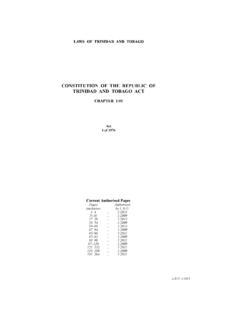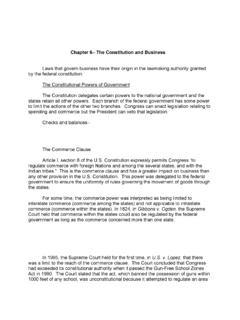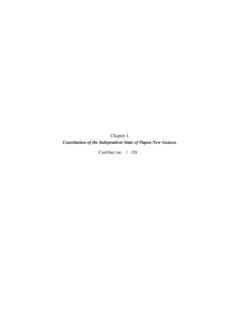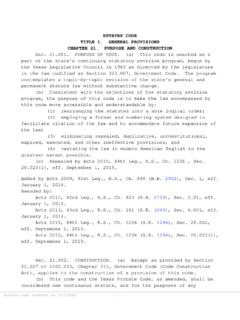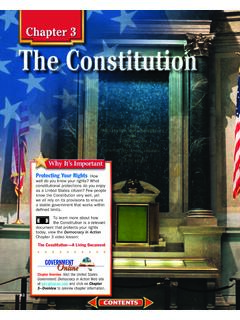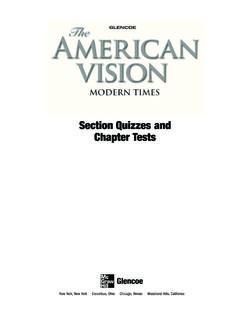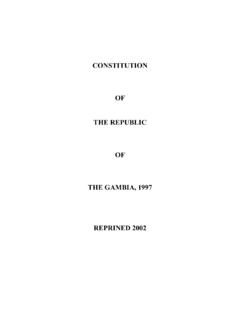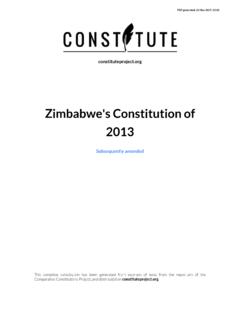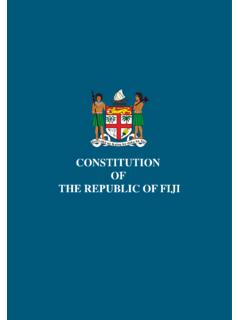Transcription of Chapter 7: Local Government
1 74 Chapter 7 Local GOVERNMENTS tatus of municipalities 151. (1) The Local sphere of Government consists of municipalities, which must be established for the whole of the territory of the Republic. (2) The executive and legislative authority of a municipality is vested in its Municipal Council. (3) A municipality has the right to govern, on its own initiative, the Local Government affairs of its community, subject to national and provincial legislation, as provided for in the constitution . (4) The national or a provincial Government may not compromise or impede a municipality s ability or right to exercise its powers or perform its functions.
2 Objects of Local Government 152. (1) The objects of Local Government are (a) to provide democratic and accountable Government for Local communities;(b) to ensure the provision of services to communities in a sustainable manner; (c) to promote social and economic development; (d) to promote a safe and healthy environment; and (e) to encourage the involvement of communities and community organisations in the matters of Local Government . (2) A municipality must strive, within its financial and administrative capacity, to achieve the objects set out in subsection (1).
3 Developmental duties of municipalities 153. A municipality must (a) structure and manage its administration and budgeting and planning processes to give priority to the basic needs of the community, and to promote the social and economic development of the community; and (b) participate in national and provincial development programmes. Chapter 7: Local Government75 Municipalities in co-operative Government 154. (1) The national Government and provincial governments, by legislative and other measures, must support and strengthen the capacity of municipalities to manage their own affairs, to exercise their powers and to perform their functions.
4 (2) Draft national or provincial legislation that affects the status, institutions, powers or functions of Local Government must be published for public comment before it is introduced in Parliament or a provincial legislature, in a manner that allows organised Local Government , municipalities and other interested persons an opportunity to make representations with regard to the draft legislation. Establishment of municipalities 155. (1) There are the following categories of municipality: (a) Category A: A municipality that has exclusive municipal executive and legislative authority in its area.
5 (b) Category B: A municipality that shares municipal executive and legislative authority in its area with a category C municipality within whose area it falls.(c) Category C: A municipality that has municipal executive and legislative authority in an area that includes more than one municipality. (2) National legislation must define the different types of municipality that may be established within each category. (3) National legislation must (a) establish the criteria for determining when an area should have a single category A municipality or when it should have municipalities of both category B and category C; (b) establish criteria and procedures for the determination of municipal boundaries by an independent authority; and (c) subject to section 229, make provision for an appropriate division of powers and functions between municipalities when an area has municipalities of both category B and category C.
6 A division of powers and functions between a category B municipality and a category C municipality may differ from the division of powers and functions between another category B municipality and that category C municipality. (4) The legislation referred to in subsection (3) must take into account the need to provide municipal services in an equitable and sustainable manner. Chapter 7: Local Government76 (5) Provincial legislation must determine the different types of municipality to be established in the province.
7 (6) Each provincial Government must establish municipalities in its province in a manner consistent with the legislation enacted in terms of subsections (2) and (3) and, by legislative or other measures, must (a) provide for the monitoring and support of Local Government in the province; and (b) promote the development of Local Government capacity to enable municipalities to perform their functions and manage their own affairs. (6A) ..[Sub-s. (6A) inserted by s. 1 of the constitution Third Amendment Act of 1998 and deleted by s.]
8 2 of the constitution Twelfth Amendment Act of 2005.] (7) The national Government , subject to section 44, and the provincial governments have the legislative and executive authority to see to the effective performance by municipalities of their functions in respect of matters listed in Schedules 4 and 5, by regulating the exercise by municipalities of their executive authority referred to in section 156(1). Powers and functions of municipalities 156. (1) A municipality has executive authority in respect of, and has the right to administer (a) the Local Government matters listed in Part B of Schedule 4 and Part B of Schedule 5; and (b) any other matter assigned to it by national or provincial legislation.
9 (2) A municipality may make and administer by-laws for the effective administration of the matters which it has the right to administer. (3) Subject to section 151(4), a by-law that conflicts with national or provincial legislation is invalid. If there is a conflict between a bylaw and national or provincial legislation that is inoperative because of a conflict referred to in section 149, the by-law must be regarded as valid for as long as that legislation is inoperative. (4) The national Government and provincial governments must assign to a municipality, by agreement and subject to any conditions, the administration of a matter listed in Part A of Schedule 4 or Part A of Schedule 5 which necessarily relates to Local Government , if Chapter 7: Local Government77(a) that matter would most effectively be administered locally; and (b) the municipality has the capacity to administer it.
10 (5) A municipality has the right to exercise any power concerning a matter reasonably necessary for, or incidental to, the effective performance of its functions. Composition and election of Municipal Councils 157. (1) A Municipal Council consists of (a) members elected in accordance with subsections (2) and (3); or (b) if provided for by national legislation (i) members appointed by other Municipal Councils to represent those other Councils; or (ii) both members elected in accordance with paragraph (a) and members appointed in accordance with subparagraph (i) of this paragraph.










